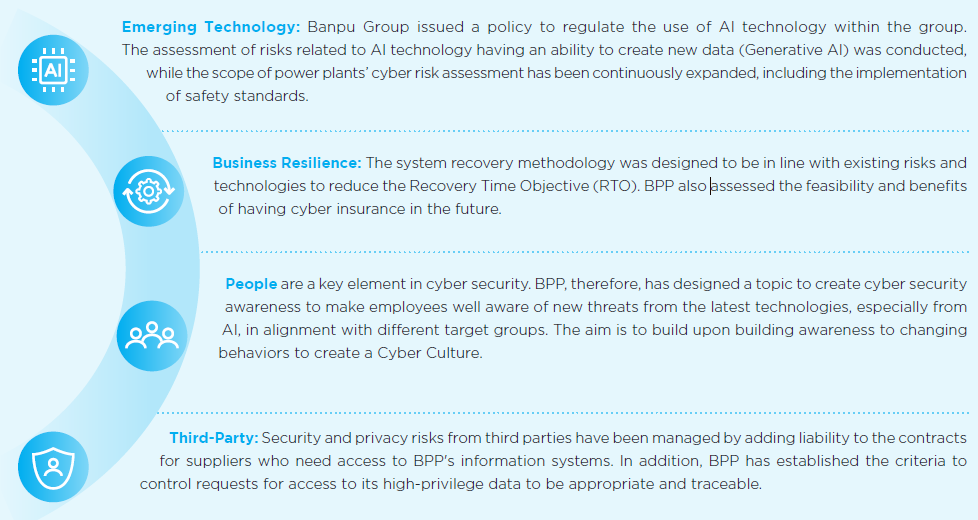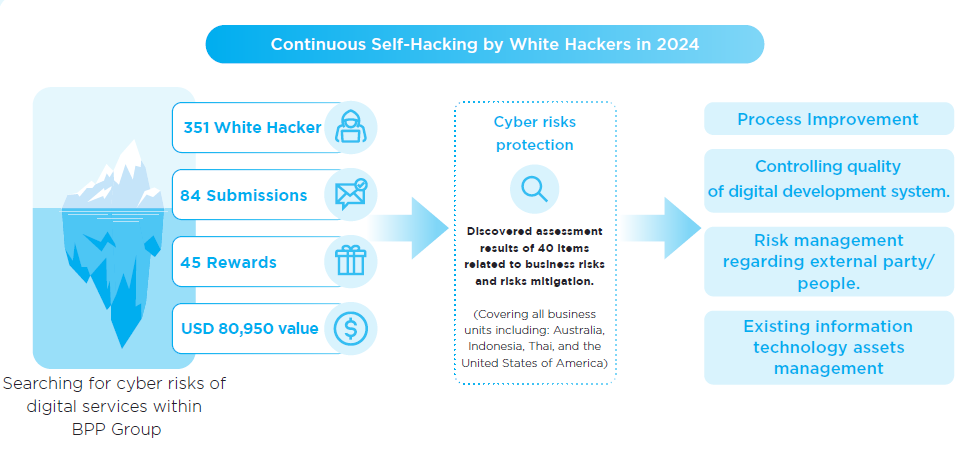Process Improvement and Innovation
Significance
“Innovation” in BPP’s context is the design and selection of high-efficiency, clean, and environmentally-friendly technology properly for each project. Innovation is also an initiative to enhance work processes to be more efficient in the long-term through conducting a study to improve the procedures continuously. This may include applying emerging technology to current tasks. Therefore, the development of production processes and innovations are the major drivers in increasing competitive advantages, especially using digital technology in the production process, supply chain management, and energy trading.
Management Approach
BPP’s core business is electricity and energy generation, which must be continuously delivered to customers at a reasonable price. As a result, the main target of production process improvement and innovation development is to enhance the power plant’s reliability and efficiency based upon the principle of “Operational Excellence” in combination with innovations carried out through employee’s participation at all levels in order to identify problems possibly arising in the working processes and improve them continuously. The process begins with training all employees to have the ability to identify problems possibly arising in their responsible working processes. In addition, the knowledge exchange forum has been arranged between business units in order to create mutual learning. They also have the opportunity to present their own projects initiated and put them into practice with fruitful results.
BPP has driven the innovation towards materialized actions as follows:
- Fostering innovative value as one of the 3 corporate culture’s shared values through creating various activities to make all employees understand the importance of applying innovation to their daily work.
- Determining channels for employees to present their innovative projects systematically to turn those initiatives into tangible practices. The project initiated will be, then, presented to the committee for budget approval for further implementation. BPP will consider all aspects involved.
- Promoting learning within the organization in the format of a Learning Application Project, by encouraging employees from various departments to jointly work on projects via using creativity and innovation.
- Collaborating with Banpu Group to establish the Innovation Committee, consisting of employee representatives responsible for promoting innovation within the organization, including internally exchanging innovations through knowledge management.
- Annually organizing the Banpu Global Innovation Awards to present the outstanding innovation projects initiated and implemented across the organization and at joint-venture companies. At the event, a panel of judges will assess the success of the projects implemented to provide financial returns to the project operators. The criteria used for projects’ assessments include the value of investment, risks, financial returns and environment, social and governance (ESG) improvement issues, including sustainability and an expansion to other production units for further executions.
Performance
- Combined heat and power (CHP) plants recorded OE of 84.24%.
- Gas-fired power plants had OE of 48.10%.
- Overall cybersecurity and privacy maturity score was 4.0.
- Bangkok Office and Beijing Office were certified ISO 27001:2013 Information Security Management Standard.
Key Activities and Projects
BPP has implemented innovation projects with an aim to create competitive advantages, improve performance and stability in the long-term. Due to production process improvement and innovation implementation in the last year, the availability factor (AF) and the forced outage factor (FOF) of power plans, in which BPP has management control, met the target set.
The process improvement and innovation projects implemented include:
Zhengding CHP Plant
- The project to conserve thermal energy for maximum efficiency
- The Smart Water management project to increase water resources use efficiency holistically
- The Biomass co-firing project to blend coal and biomass together to be used as fuel at the power plant
Luannan CHP Plant
- The Waste Heat Recovery by Utilizing De-White Facility project
- The Digital Twins project to enhance production efficiency and decrease air pollutants
Zouping CHP Plant
- The improvement of boiler scale removal system project
- The project to recover residual heat from waste gas to increase boiler efficiency
Temple gas-fired Power Plant
- The project to increase power plants’ reliability
BLCP Power Plant
- The Bio-Carbon Capture by Algae project
- The Smart Approaches to Energy Saving project
HPC Power Plant
- The Advanced Leakage Monitoring and Alerting software (ALMA) project
- The project to increase boiler’s combustion efficiency
HPC Power Plant has been collecting and analyzing its efficiency data since 2019 and found that the main factor affecting its efficiency is the deterioration of the cooling panels and water nozzles, causing the cooling tower unable to work at its maximum potential.
After studying and designing the new heat sinks and nozzles with UV resistance, increasing the heat exchanger area with corrosion resistance, HPC Power Plant has improved its efficiency and reduced coal consumption by 440,000 tonnes per year, or saved approximately USD 3.87 million per annum.
HPC Power Plant has been using the boiler tube leak detection and warning software or the “Advanced Leakage Monitoring
and Alerting Software” (ALMA) since 2022. Training has been arranged for production staff to provide them with knowledge and understanding about the power plant’s abnormality detection when a boiler tube is leaking, so that they can use the software effectively.
The ALMA is a digital technology application in the field of artificial intelligence (AI) to help detect leaks in boiler pipes,
allowing for the detection of leak signals 3 – 5 days in advance. The model is developed from machinery statistics and other related data, such as sound signals, water volumes added into the system, etc. Then, an alert signal will be sent to the production staff, allowing the power plant to make a decision to plan maintenance in advance and reduce the loss from fines due to a short notice on power plant’s shutdown.
In 2024, ALMA provided early warnings of irregularities, which helped reduce fines for breaching the electricity purchase
agreements by around THB 25 million.
In addition to improving production processes and innovation development, BPP also focuses on transforming its operations by using digital technology to drive the business towards the future and developing a cyber-risk prevention system for power plants. This covers both Information Technology (IT) and Operational Technology (OT) as the power business is associated with local security, which may be the target of cyber-attacks or threats. Therefore, it is necessary to conduct risk assessments, test security, and establish up-to-date preventive measures. A Global Information Security Officer (GISO) is employed with assignments/duties and responsibilities in supervising information security, digital technology risks, and legal compliance covering the entire Banpu Group. In the past year, the following significant operations were carried out:
- The 2024 information security and risk assessment was conducted by an external consulting firm, with an overall score of 4.0 (out of 5), up from 3+ in the previous year. This improvement resulted from more stringent measures to prevent cyber risks from the third-party risk operations.
- Organizing a business continuity plan (BCP) exercise to test the response plan in case of a business and personal data breach, with the following objectives:
- To test the relevant incident response plan and business & personal data leakage plan.
- To review and make understanding about the concepts, roles, and responsibilities of the relevant employees.
- Examining the effectiveness of internal communications.
- To improve the recovery system methodology to be consistent with current risks and technologies in order to reduce the Recovery Time Objective (RTO).
- Started implementing the 2022 ISO 27001 Information Security Standard to help strengthen information security
management, reduce risks, and protect data from theft at Bangkok and Beijing offices.
Cybersecurity governance and compliance with relevant laws are important for business operations to create sustainably
added value for all stakeholders. BPP has, therefore, raised the governance level in 3 important areas as follows:
- The issuance of a policy to supervise the use of AI technology within the organization based upon the principle of Responsible Use of AI.
- Unify governance to cover Information Technology (IT), Operational Technology (OT), and AI Technology.
- The introduction of international standards for governance, including the ISO 42001:2023 AI Management System (AIMS) for artificial intelligence management systems and the ISO 27001:2022 Information Security Management System (ISMS) for information security management.
In 2024, BPP operated with key plans in 4 target groups as follows:

The implementation of this plan enabled BPP to receive a cybersecurity and privacy maturity score of 4.0 (out of 5) in 2024, up from the 3+ level in 2023.
Banpu Group has been implementing the Self-Hacking by White Hackers or the “Bug Bounty” project since 2022. This project is currently in its 3rd consecutive year to strengthen cybersecurity and maintain the resilience of digital services for business operations. The project works with a group of ethical hackers to assess security vulnerabilities around the clock, under strict operating rules and strict confidentiality agreements. The project’s cybersecurity vulnerability assessment covers companies in Australia, China, Indonesia, Thailand and the United States of America to achieve the 3 key goals:
- An assessment of security vulnerabilities from external party use.
- Continuously searching and monitoring to close risks in time.
- Being ready to use emerging technologies that will be used in BPP group.

The results of this project will be used to improve the efficiency of cybersecurity governance processes in a sustainable manner in 3 areas:
- Quality Assurance of digital system development
- Third-Party Risk Management (TPRM)
- IT Asset Management (ITAM)
Document Download
Innovation Policy

Information and Cybersecurity Policy

Banpu Group’s Artificial Intelligence Policy







